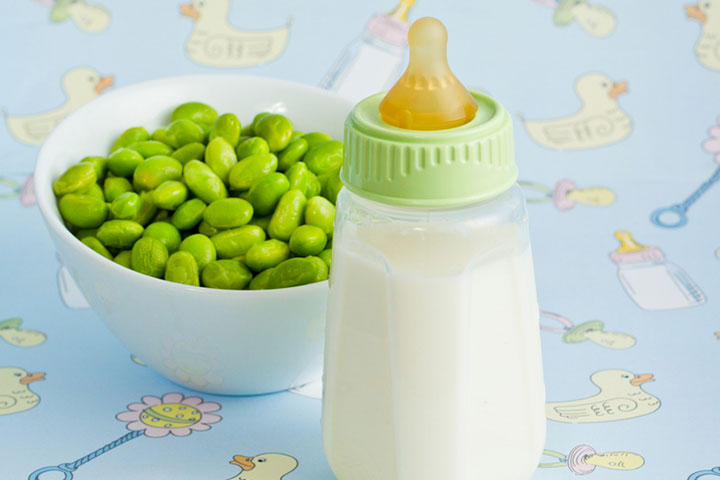Soymilk or soya milk is a great plant-based milk option for lactose-intolerantiXIt refers to a person who cannot digest lactose due to enzyme lactase deficiency. Symptoms include diarrhea, abdominal cramps, and bloating. individuals. However, soy milk for babies may not be as suitable for adults. Although it is prepared from soybeans, which are rich sources of vital minerals and nutrients and considered a good alternative for a milk-based formula in infants, most parents are concerned about the allergies it may trigger in babies. Keep reading to learn about the safety aspects, some common myths, and other details on giving soy milk to babies.
Is It Safe To Give Soymilk To Babies?
The American Academy of Pediatrics states that soy-based formulas are completely safe for infants, and also they provide nutrition equivalent to the usual cow milk-based formula powders (1).
However, soy formula for infants is different from soymilk for adults.
- Soymilk is made from ground soybean paste. It is an emulsion of soybean paste, water and sometimes added vegetable oil. It is unsuitable for babies due to their sensitive digestive system, and additional nutritional requirements.
- For this reason, soy protein and other essential nutrients are extracted from the soybean to make soy infant formula powder, which is fortified with additional nutrients required by the baby. ‘Soymilk’ here means ‘soy infant formula milk’.
Never give regular soymilk to a baby younger than two years. Soy infant formula milk is the only soy product that your little one should consume until he is two years old.
Soy infant formula should not be fed to premature/preterm babies, since their body does not have the biochemical process to digest various complex compounds of soybean. Also, preterm infants fed with soy formula are at a risk of developing osteopenia, a condition where the bones turn brittle due to inadequate formation of new bone cells.
Also, you cannot introduce the soymilk formula to the baby too early in his life.
An anonymous mother shares how she learned the hard way that those with dairy allergies can also be allergic to soy. She explains, “E (her baby) was born with a dairy protein allergy. Since many children outgrow this milk protein allergy quickly, we didn’t think much of it. When she was 2, she had a particularly dairy-rich day and vomited her supper and dessert all over the place. We cut back her dairy (not completely) and put her on soy milk instead. Unfortunately, those with dairy allergies can often develop soy allergies (who knew?!?). When the reactions went down but then picked up again after a few days/weeks, we were able to point to soy as another culprit (i).”
When Can A Baby Have Soymilk Formula?
Babies can have soy formula at the age of 12 months (2).
Parents who wish to feed formula to their baby can consider protein-packed soy-based infant formula. In fact, in some situations, soy infant formula could be among the few ways to nourish the baby.
In What Situations Would A Baby Require Soy Infant Formula?
A parent may prefer soy infant formula to cow milk-based formula, or switch to soy infant formula under the following circumstances:
1. The infant suffers from galactosemia:
Galactosemia is a rare genetic disorderiXA health disease or disorder caused due to a change or mutation in the gene. where the body lacks the ability to convert galactose, a complex milk sugar, to glucose, which is a simpler sugar (3). Galactose is found in all types of milk including human milk, which makes breastfeeding an infant suffering from this condition impossible. Cow milk-based infant formula also contains galactose unless specified to be galactose-free.
Soy infant formula can be a good milk substitute for babies with galactosemia, but only for those older than 12 months. Babies below 12 months should be fed a special galactose-free formula recommended by a doctor.
2. The infant with any form of lactose allergy:
Some babies may have an immunological intolerance to lactose, where the body detects lactose as a pathogen and mounts an attack on it. This condition is referred to as lactose allergy. Babies who are allergic to lactose can have soy-based formulas, which are naturally free of lactose sugar.
With lactose intolerance the baby’s body does not produce the enzyme lactase, which is imperative for the breakdown of lactose. It happens because the baby lacks the necessary genes for the production of lactase. This genetic disorder is called transient lactose intolerance (4). Babies with this abnormality can derive nourishment from soy-based or lactose-free infant formula.
3. Parents who want their baby to follow veganism:
Infants born to vegan parents can be fed soy-based formula as an dairy-free alternative to cow milk-based formulas. Soy infant formula powder is free from any animal-based derivatives and substances. Babies being weaned from breast milk after 12 months can be fed soy formula.
Soy infant milk is suitable for babies even if they do not fall under any of the above categories. However, certain misapprehensions stop parents from trying this food for their babies.
What Are The Myths Associated With Soy Infant Formula?
There are several myths about the side-effects of soy infant formula for babies. Here we bust some of the most popular myths:
Myth 1: Soy infant formula is less nutritious than cow milk-based infant formulas.
Truth: Soy infant formula is nutritionally equivalent to cow milk-based infant formulas:
Soy formula powder is nutrient-rich and is fortified with added nutrients and minerals. In fact, the benefits of soy infant formula are the same as cow milk-based formulas since manufacturers maintain a nutritional equilibrium in the products.
A study by the AAP has found that soy-based infant formula had 20% more calcium and phosphorus than cow milk-based formulas (5). Researchers saw no difference in bone growth between infants fed with soy baby formula and those fed with conventional milk-based formulas.
Myth 2: Soy can cause hormonal imbalances and problems in infants.
Truth: Soy does not cause hormonal imbalances in babies.
Soybeans are rich in isoflavones, which are compounds with a chemical structure similar to the female sex hormone estrogeniXIt is a hormone that develops and regulates the female reproductive system and secondary sex characteristics.. Many believe that soymilk exposes an infant to excess isoflavone, which may lead to hormonal imbalances and subsequent problems like precocious puberty, especially in females. Boys are feared to develop female sexual characteristics at puberty.
That sounds unsettling, but AAP states that there is no concrete scientific evidence to prove that the consumption of soy-based formulas can lead to hormonal problems. There is no conclusive data on the matter, but most research indicates that soy has no impact or influence on the baby’s endocrine systemiXA system that controls the body’s growth, reproduction, metabolism, stress responses, and mood through the hormones secreted by its glands.. Isoflavones are found in breast milk as well. Therefore, a baby’s kidneys seem quite adept at filtering and excreting the compound.
Myth 3: Soy formula is laden with aluminum.
Truth: Modern soy formula do not have harmful levels of aluminum.
During the mid-1990s, soy-based formulas were found to have a high concentration of aluminum due to the mineral salts added to fortify the formula. However, current soy infant formulas do not contain harmful levels of aluminum due to improvements in formulations. Researchers found no impact of aluminum on infant’s health since the element is present even in breast milk (6). Babies with normal renal function can excrete aluminum from their body. Only preterm infants are at risk, but soy formula is not recommended for premature babies.
Myth 4: Soy formula causes acute diarrhea
Truth: There is no scientific evidence to prove it.
Several studies have found no link between the consumption of soymilk and the onset of diarrhea. Babies can feed on soy-based formula when they are suffering from acute diarrhea, and it has no impact on the speed of recovery. In fact, some studies have noted a shorter duration of diarrhea in infants fed with soy infant formula, compared to those fed with cow milk-based formulas.
Soy infant formula is said to cause constipation, but there is no evidence backing the conjecture.
While these may be just myths, there are some real fears associated with soy formulas.
When Must A Baby Not Consume Soy Formula?
You need to fear soy formulas if the baby has any of the below health conditions:
1. When an infant suffers from an allergy or is prone to it:
A baby can be allergic to soy, just like any other food. About 10 to 14% infants with cow milk allergy also suffer from a soy allergy. If the baby is allergic to cow milk or any other food, then you must be extra cautious before giving him soy-based formula. There are two different types of allergy – IgE medicated (immediate) and non IgE (delayed) a baby may show signs of either or both to soya. It is important to monitor symptoms if given soya formula.
Babies who experience asthma, eczema, and allergic rhinitis, may be more susceptible to a soy allergy.
However, soymilk allergy is less common than cow milk allergy. Some extensive studies by the AAP have concluded that less than one percent of soy formula-fed babies develop an allergy towards it. But soy allergy does exist. Therefore, you must look out for the following symptoms:
- Skin hives: Tiny bumps on the skin that appear in clusters or straight lines
- Swollen mouth: There will be a severe swelling of tongue, lips, and the neck muscles, which all make it difficult for the infant to eat and breathe.
- Swelling around eyes: Eyelids and the area just below the eyebrows swell. These areas may also appear red or dark pink in color.
- Abdominal pain: The pain in the abdomen could be accompanied by vomiting and diarrhea.
- Shortness of breath: The baby feels breathless due to swollen chest muscles and inflamed alveoliiXThese are the air sacs in the lungs where oxygen and carbon dioxide exchange happens between blood and the lungs during breathing. in the lungs. The little one gasps for every breath.
- Weakness and dizziness: The baby appears dizzy, weak, and fatigued all the time.
If you observe any of these symptoms or even remotely suspect the baby is experiencing food allergy, then take him to a doctor.
2. Congenital hypothyroidism:
The condition has manifestations similar to hypothyroidism in adults. Congenital hypothyroidism is extremely rare but causes several developmental delays in the baby (7). It occurs when the thyroid gland does not produce enough hormone, or in most cases, when the gland is missing at birth. Babies with the condition are administered replacement hormones, and soy protein has been found to interfere with the absorption of the hormone in the body. If the baby is still fed with soy formula, then he will require large doses of replacement thyroid hormone, which is harmful to the baby’s health.
An infant clinically diagnosed with congenital hypothyroidism should stay away from any soy-based formula products.
3. Milk-induced enterocolitis:
Enterocolitis is the inflammation of the inner lining of the small and large intestine due to a variety of reasons including milk protein allergy. Babies with cow milk allergy-induced enterocolitis have a sensitive intestinal mucous lining that can be affected by other types of protein. About 60% infants with milk-induced enterocolitis can also display sensitivity towards soy protein. Such infants should not be fed with soy formula.
Babies with the condition can be nourished through hydrolyzed protein formulas where the milk protein is broken down into smaller amino acid chains that do not trigger an allergic reaction. Hydrolyzed formula milk is also recommended for babies allergic to both milk and soy.
If your baby does not have any of the above conditions, then you can go ahead and feed him with soy formula of a brand of your liking.
Popular Soy Baby Formula Brands
There are several soy-based infant formula products tailored to meet the nutritional requirements of different infant age groups. Here are some of the popular brands of soy infant formula:
- Similac Go & Grow Soy
- Gerber Good Start Soy
- Vermont Organics Soy
- Enfamil Enfagrow Soy Toddler
- Similac Soy Isomil
- Gerber Good Start Soy Formula – Concentrated Liquid
- Gerber Good Start Soy Formula – Ready to Feed
Most brands have multiple variants with different nutritional values. Consult your doctor before making a choice.
When Can A Baby Have Regular Soymilk?
There is no standard recommendation on the appropriate age to introduce regular soymilk. However, if a baby is eating a balanced weaning diet fortified soya milk can be introduced around 12 months old. If the infant suffers from protein-induced enterocolitis, then he must stay away from all soy products until five years of age.
When introducing regular soymilk to the toddler, start with a small serving. If it suits him, you can give the milk regularly. The symptoms of soymilk allergy are the same as those of soy infant formula allergy. There are several variants of packaged soymilk but go for plain unsweetened soymilk with no added flavoring, and preservatives, and is fortified with calcium, iodine and preservatives.
Soy milk can have several benefits for toddlers when compared to cow milk:
- Soymilk has fiber: A 100g of packaged cow milk contains no fiber (8) while the same quantity of unfortified soymilk has at least 0.6g of fiber (9).
- Low on saturated fat: Soy milk has less saturated fat than even the 1% fat cow milk contains.
- Zero cholesterol: Even skimmed variants of cow milk have some percentage of cholesterol. Soymilk is naturally free of cholesterol.
Soymilk can be a healthy beverage for your toddler since its nutritional content is nearly identical to that of cow’s milk. Health professionals from Harvard Medical School state that there is no reason why the little ones should stay away from soymilk since soy products have been part of the human diet for centuries (10).
Soy milk-based formulas can provide the necessary nutrients required for infant nutrition, comparable to those found in cow-milk formulas.Regular soy milk is not recommended for babies younger than two years. It is also advised to avoid feeding soy milk-based formulas to preemies since they cannot process the ingredients and often result in brittle bones. Usually, pediatricians recommend soy milk formulas for galactosemia and lactose intolerance babies. Parental preference for a vegan diet can also be a reason to give soy milk to babies. Also, there is no conclusive evidence to prove myths such as soy milk may cause hormonal imbalances in babies.
Key Pointers
- The American Academy of Pediatrics deems soy milk safe for babies.
- Soy milk is often given to babies with galactosemia or lactose allergy.
- It is recommended to introduce soy milk formula to babies after they turn 12 months old.
- Babies with soy allergy or milk-induced enterocolitis should avoid soy milk.















